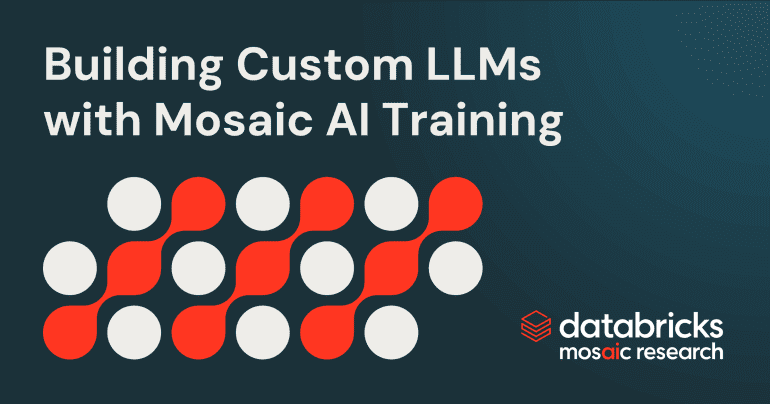- Databricks introduces Mosaic AI enhancements for building robust AI systems and applications.
- Focus areas include support for compound AI systems, model quality improvement, and AI governance.
- Compound AI systems leverage multiple components for higher production quality.
- New tools like Mosaic AI Agent Framework and Tools Catalog streamline development and governance.
- Mosaic AI Model Training fine-tunes models with private data, enhancing quality and reducing costs.
- Mosaic AI Gateway offers unified governance across all Generative AI applications and models.
Main AI News:
In the fast-evolving landscape of artificial intelligence, Databricks, renowned for its expertise in Data and AI solutions, has unveiled a suite of enhancements to its Mosaic AI platform. These innovations are strategically designed to assist enterprises in developing production-quality Generative AI applications. With a focused investment in three critical areas—support for building compound AI systems, enhancing model quality, and introducing new AI governance tools—Databricks aims to empower organizations to realize the full potential of Generative AI while addressing prevalent challenges effectively.
The transition from pilot to full-scale production in Generative AI projects has been hindered by concerns surrounding privacy, quality, and cost. Despite significant advancements in foundation models, the persisting issue of generating high-quality results remains. Even the most sophisticated models are prone to producing inaccurate, unsafe, or privacy-compromising responses. To combat these challenges, enterprises are embracing the concept of compound AI systems, which leverage multiple components including diverse models, retrievers, vector databases, and comprehensive evaluation, monitoring, security, and governance tools. This approach significantly elevates the production quality of AI applications, enabling organizations to deliver solutions that are not only accurate and safe but also well-governed.
“We firmly believe that compound AI systems will emerge as the cornerstone for maximizing the quality, reliability, and measurability of AI applications in the future, potentially defining one of the most crucial trends in AI for 2024,” states Matei Zaharia, Co-founder and CTO at Databricks. “Databricks is strategically positioned to leverage these trends through our ongoing investments aimed at enhancing quality, augmenting models with real-time data and agents, and equipping them with tools to extend their capabilities beyond their inherent knowledge.”
To facilitate the development of production-quality Generative AI applications, Databricks is rolling out a comprehensive set of tools under the Mosaic AI umbrella, including the Mosaic AI Agent Framework, Mosaic AI Agent Evaluation, Mosaic AI Tools Catalog, Mosaic AI Model Training, and Mosaic AI Gateway.
Mosaic AI Agent Framework and Mosaic AI Tools Catalog serve as indispensable resources for organizations embarking on the journey of building compound AI systems. The introduction of RAG (Retriever-Aided Generation) represents a significant milestone in this endeavor. RAG exemplifies a compound AI system, harnessing various components such as vector databases and a suite of monitoring, evaluation, security, and governance tools to enhance the accuracy and reliability of Large Language Models (LLMs). With the newly launched Mosaic AI Agent Framework, developers can swiftly and securely build high-quality RAG applications by leveraging foundation models in conjunction with enterprise data. The accompanying Mosaic AI Agent Evaluation tool facilitates rapid iteration and deployment of applications by providing AI-assisted evaluation capabilities, ensuring outputs meet high-quality standards and soliciting feedback from human stakeholders. Collectively, these capabilities empower organizations to deploy production-quality Generative AI solutions with confidence.
Furthermore, compound AI systems often require specialized tools to enable interaction with the external environment, such as code generation, web searching, API invocation, and more. The Mosaic AI Tools Catalog offers a centralized repository for governing, sharing, and registering such tools, leveraging the Databricks Unity Catalog. This ensures secure and governed utilization of tools within tool-enabled models while enhancing discoverability across the organization.
Mosaic AI Model Training represents a pivotal advancement in fine-tuning foundation models, thereby enhancing model quality and reducing operational costs. By fine-tuning open-source foundation models with proprietary data, organizations can imbue these models with domain-specific knowledge, resulting in higher-quality outcomes for targeted use cases. These fine-tuned models, owned and controlled entirely by the customer, not only exhibit superior accuracy within specific domains but also boast reduced computational overhead, making them faster and more cost-effective to deploy compared to larger proprietary models.
Lastly, Mosaic AI Gateway emerges as a comprehensive solution for governance across all Generative AI applications and models. Offering a unified interface for querying, managing, and deploying open-source or proprietary models, Mosaic AI Gateway enables seamless switching between LLMs powering applications without necessitating intricate changes to application code. The platform supports usage tracking and implements guardrails to facilitate cost control and ensure safety and compliance, irrespective of the model in use. With built-in governance and monitoring capabilities, Mosaic AI Gateway continuously ensures the delivery of high-quality outcomes.
Testimonials from industry leaders underscore the transformative impact of Databricks’ Mosaic AI solutions. Denis Kamotsky, Principal Software Engineer at Corning, highlights the pivotal role of Mosaic AI Agent Framework in enhancing retrieval speed, response quality, and accuracy, enabling researchers to expedite their tasks efficiently. Tom Thomas, VP of Analytics at FordDirect, emphasizes the seamless integration facilitated by Mosaic AI Agent Framework, Delta Tables, and Unity Catalog, empowering FordDirect to deliver a unified chatbot solution tailored to their unique requirements. Kenan Colson, VP Data & AI at Lippert, lauds the game-changing capabilities of Mosaic AI Agent Framework in evaluating GenAI application results with precision while retaining full control over data sources, thus instilling confidence in deployment to production environments.
Conclusion:
Databricks’ introduction of the enhanced Mosaic AI suite signifies a significant leap forward in the realm of Generative AI. By addressing critical challenges related to model quality, governance, and cost-effectiveness, Databricks empowers enterprises to realize the full potential of AI applications. This development is poised to reshape the market landscape, driving increased adoption of AI technologies and setting new standards for quality and reliability in AI-powered solutions.

